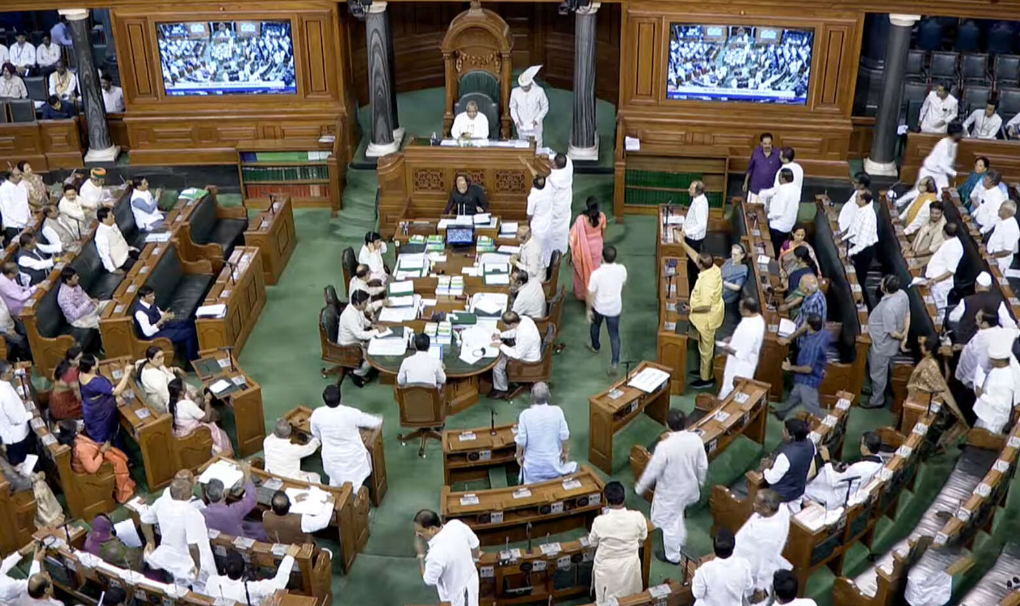New Delhi: The Rajya Sabha has passed the Mines and Minerals (Development and Regulation) Amendment Bill, 2023 for making amendments to the Mines and Minerals (Development and Regulation) Act, 1957 (hereinafter referred to as ‘the Act’) today. The Bill was passed by the Lok Sabha on 28.07.2023 and with the passage of the Bill in Rajya Sabha, the Bill will be sent to the President of India for assent. The MMDR Act, 1957 was comprehensively amended in 2015 to bring several reforms in the mineral sector, notably, mandating a method of auction for grant of mineral concessions to bring transparency in the allocation of mineral resources, for establishing District Mineral Foundation (DMF) for the welfare of the people and areas affected by mining and for establishing National Mineral Exploration Trust (NMET) to give thrust to exploration and for ensuring stringent penalty for illegal mining. The Act was further amended in 2016 and 2020 to address specific emergent issues and was last amended in 2021 to bring further reforms in the sector, such as removing the distinction between captive and merchant mines, transfer of statutory clearances to ensure continuity in mining operations even with change of lessee, removing the restrictions on transfer of mineral concessions, lapsing of rights of non-auctioned concession holders which have not resulted in mining leases to ensure that concessions to the private sector are only granted through auction etc.
However, the mineral sector required certain reforms, particularly for increasing exploration and mining of critical minerals that are essential for economic development and national security in the country. The lack of availability of the critical minerals or the concentration of their extraction or processing in a few geographical locations may lead to supply chain vulnerabilities and even disruption of supplies. The future global economy will be underpinned by technologies that depend on minerals such as lithium, graphite, cobalt, titanium, and rare earth elements. Critical minerals have gained significance in view of India’s commitment towards energy transition and achieving net-zero emissions by 2070. Accordingly, it was proposed to further amend the said Act by enacting the Mines and Minerals (Development and Regulation) Amendment Bill, 2023. With the worldwide focus on critical minerals, the amendment introduces major reforms in the mining sector which include the omission of 6 minerals from the list of 12 atomic minerals specified in Part-B of the First Schedule of the Act, namely, Lithium bearing minerals, Titanium bearing minerals and ores, Beryl and other beryllium bearing minerals, Niobium and Tantalum bearing minerals and Zirconium bearing minerals. Empowering Central Government to exclusively auction mineral concessions for critical minerals specified in Part D of the First Schedule of the Act. Revenue from these auctions will accrue to the concerned State Government. and introducing exploration licence for deep-seated and critical minerals.











reputable canadian online pharmacies
purchase alendronate generic generic nitrofurantoin 100mg buy nitrofurantoin cheap
canadian pharmacy antiobotics without perscription
order inderal online cheap ibuprofen 400mg us buy clopidogrel paypal
buy glimepiride online cheap buy generic arcoxia for sale order arcoxia 120mg
nortriptyline 25 mg tablet order methotrexate 2.5mg generic order panadol 500 mg online
buy xenical 60mg generic order diltiazem for sale diltiazem buy online
order generic coumadin maxolon online buy maxolon for sale
buy pepcid cheap generic losartan 25mg tacrolimus buy online
order astelin 10ml without prescription azelastine 10ml canada buy irbesartan pill
order nexium 40mg capsules cheap esomeprazole buy topiramate pill
zyloprim 100mg canada brand crestor 20mg order rosuvastatin for sale
sumatriptan 25mg price order dutasteride generic purchase avodart online cheap
buspirone over the counter ezetimibe 10mg tablet oral amiodarone 200mg
zantac drug mobic 15mg cheap brand celebrex 200mg
purchase motilium pills order motilium 10mg pills buy generic sumycin over the counter
pay for a research paper i need help with my essay essays help
oral spironolactone oral valacyclovir cheap finasteride
sildenafil 50mg brand sildalis buy online estrace generic
diflucan 100mg us forcan ca cipro 1000mg without prescription
flagyl 200mg without prescription buy cephalexin for sale order cephalexin online cheap
cost lamotrigine 50mg order nemazole for sale vermox brand
buy cleocin sale erythromycin 500mg usa buy fildena generic
buy retin paypal tretinoin gel generic order avana 100mg
buy nolvadex 10mg buy nolvadex 10mg sale symbicort sale
buy tadacip 20mg online cheap tadalafil order online buy indomethacin without a prescription
order cefuroxime 250mg for sale careprost online buy robaxin
desyrel pill suhagra 100mg cheap clindac a order
where can i buy lamisil bonus casino can you play poker online money
purchase aspirin pills online casino slots best online casinos that payout
academic writing is order suprax 200mg pill order suprax 200mg generic
pay essay writing online slots for real money slot machine
order generic amoxicillin order trimox 250mg sale buy clarithromycin paypal
rocaltrol 0.25mg oral order calcitriol 0.25 mg online cheap fenofibrate pills
If you meet the eligibility requirements, you can apply for a place to rent under the scheme. You can find properties currently available in Queensland by visiting National Rental Affordability Scheme Properties for Rent on realestate.au. With OpenRent, tenants pay no admin fees – saving you over £300 on average. We don’t let landlords charge you their own fees, either. It’s the best way to find cheap property to rent! My goal with this newsletter is to help YOU realize your dream of owning a vacation home in Japan — for cheap! With a housing choice voucher, you can find your own private housing to rent. Housing choice vouchers can pay for all or part of the rent. Student Rentals Knight Frank are members of the Property Redress Scheme (Consumer Redress Scheme) and RICS Dispute Resolution Service (Business Redress Scheme) and have Client Money protection with RICS Client Money Protection Scheme.
https://www.party.biz/profile/granfieldestate
In total Estepona offers seventeen quality beaches with soft sand, public amenities, a variety of bars & restaurants, playgrounds for kids and some great recreational spaces. Whether you prefer relaxing on the beach, eating tapas in the old town or hiking in the Sierra Bermeja, Estepona has something for everyone. It’s a charming seaside resort with loads of fun attractions for the family. Shared Ownership New Build: Also known as part buy part rent, with this affordable home ownership scheme you purchase a share of a brand new property and rent the remainder from the housing provider. The price shows the minimum share available, and the size of the share you purchase will depend on what you can afford. We have plenty of properties for sale in Estepona – both new and resale property. Browse our selection of property for sale in Estepona.
clonidine 0.1 mg oral cheap catapres tiotropium bromide 9mcg tablet
expensive acne medication trileptal tablet trileptal buy online
minocin 50mg sale terazosin buy online order requip 2mg for sale
buy cheap generic alfuzosin medications that cause gerd symptoms always nausea after taking medication
letrozole for sale online albenza 400 mg canada buy abilify medication
buy strongest sleeping pills olumiant approved for alopecia buy prescription weight loss medication online
order provera 5mg order hydrochlorothiazide online cheap generic hydrochlorothiazide
cdc quit smoking free medication buy online medication site online physician consultation pain medication
Great information shared.. really enjoyed reading this post thank you author for sharing this post .. appreciated
buy cyproheptadine sale oral luvox 50mg buy ketoconazole
buy herpes drugs best herpes suppression medication how to reverse prediabetes quickly
what is lamisil cream used for list blood pressure medications recalled heart power trio berries
cymbalta brand modafinil online provigil 200mg price
gastritis with erosions uti treatment guidelines for elderly boots online doctor login
purchase promethazine generic stromectol 3mg ca stromectol cream
does medical cover birth control volume pills before after best pills to increase sperm
deltasone 10mg usa deltasone 5mg cost amoxicillin 500mg uk
gerd medications list heartburn over the counter remedies father christmas pill
buy actigall 150mg pills urso 300mg tablet zyrtec 5mg without prescription
strattera 25mg for sale order quetiapine pills sertraline 50mg brand
buy furosemide generic diuretic albuterol 4mg generic where can i buy ventolin
buy escitalopram 10mg generic purchase escitalopram cheap naltrexone 50mg
[url=https://synthroid.directory/]synthroid 12.5 mcg[/url]
cost clavulanate buy amoxiclav online cheap order clomiphene 100mg online
combivent 100mcg usa order zyvox 600mg for sale purchase linezolid for sale
starlix 120mg tablet order captopril generic candesartan medication
levitra brand purchase vardenafil online cheap order plaquenil pill
purchase tegretol online buy ciprofloxacin 500 mg for sale lincomycin tablet
order cenforce pills order cenforce sale metformin 500mg cost
buy atorvastatin 40mg for sale where to buy norvasc without a prescription buy zestril 5mg for sale
cefadroxil 500mg generic duricef 250mg oral order lamivudine
buy generic omeprazole 20mg buy prilosec generic brand atenolol
buy generic dostinex loratadine 10mg cost dapoxetine 30mg drug
oral medrol cost order clarinex 5mg for sale clarinex online order
cytotec cost oral diltiazem buy generic diltiazem
buy nootropil 800mg online buy clomipramine generic buy anafranil 25mg without prescription
buy zovirax pill order zyloprim 100mg without prescription oral crestor
buy generic itraconazole where can i buy tinidazole order tinidazole 500mg online
where can i buy ezetimibe purchase tetracycline generic order tetracycline 250mg online
cheap olanzapine 10mg order diovan 160mg online cheap buy diovan 80mg generic
flexeril 15mg us order toradol 10mg without prescription ketorolac pills
buy gloperba for sale buy propranolol tablets buy methotrexate generic
dermatologist approved acne treatment buy generic prednisone 5mg prescription acne medication for adults
allergy medications prescription list buy albuterol 2mg online best generic allergy pills
best antacid over the counter how to buy trimethoprim
online sleep medication perscriptions buy phenergan generic
deltasone 20mg brand prednisone 20mg without prescription
best medicine for acid indigestion buy perindopril online cheap
acne pills prescribed by dermatologist where can i buy benzoyl peroxide medications that help with acne
best daily acid reflux medicine ramipril 5mg for sale
order accutane 40mg online buy accutane 20mg sale order isotretinoin 20mg
prescription sleep drug list buy phenergan 25mg without prescription
Забота о недвижимости – это забота о удобстве. Утепление фасадов – это не только изысканный облик, но и гарантия сохранения тепла в вашем уголке уюта. Мастера, группа специалистов, предлагаем вам превратить ваш дом в идеальное место для жизни.
Наши творческие решения – это не просто теплоизоляция, это творческий процесс с каждым элементом. Мы придерживаемся идеальному балансу между внешним видом и практической ценностью, чтобы ваш дом преобразился не только пригодным для жизни, но и шикарным.
И самое главное – разумная цена! Мы полагаем, что качественные услуги не должны быть неподъемными по цене. [url=https://ppu-prof.ru/]Сколько стоит утепление стен снаружи цена[/url] начинается всего от 1250 рублей за квадратный метр.
Современные технологии и качественные материалы позволяют нам создавать тепловую обработку, которая обеспечивает долговечность и надежность. Позабудьте о проблеме холодных стен и избегайте дополнительных расходов на отопление – наше утепление станет вашим надежным экраном от холода.
Подробнее на [url=https://ppu-prof.ru/]интернет-ресурсе[/url]
Не откладывайте на потом заботу о счастье в вашем уголке. Обращайтесь к экспертам, и ваше жилье станет настоящим архитектурным искусством, которое принесет вам тепло и удовлетворение. Вместе мы создадим дом, в котором вам будет по-настоящему комфортно!
order amoxil 250mg sale buy amoxicillin generic cost amoxicillin 250mg
azithromycin cheap azithromycin pills zithromax 500mg tablet
buy neurontin 100mg online cheap buy neurontin 600mg online
azipro pills buy azipro for sale buy azipro 250mg
purchase lasix pill buy lasix 40mg generic
buy omnacortil 5mg pills buy omnacortil 20mg online cheap buy omnacortil 20mg sale
order amoxicillin 500mg generic amoxil 1000mg us brand amoxicillin 1000mg
vibra-tabs buy online order doxycycline 100mg online cheap
order ventolin 4mg for sale buy antihistamine pills order ventolin 4mg for sale
order augmentin pill order amoxiclav generic
buy synthroid 75mcg for sale synthroid price synthroid 150mcg price
order levitra 10mg online buy cheap generic levitra
clomid 100mg generic clomiphene 50mg sale buy clomid medication
buy generic rybelsus over the counter semaglutide order online generic rybelsus
buy deltasone 20mg online order prednisone 20mg pill buy deltasone 5mg online
rybelsus 14mg pill buy rybelsus 14mg order semaglutide for sale
Great website.ots of useful information here. look forward to the continuation.<a href="https://www.google.co.il/url?sa=i
buy accutane sale buy cheap accutane order isotretinoin for sale
amoxicillin 250mg uk order amoxicillin 250mg generic cheap amoxil generic
buy augmentin online buy augmentin tablets augmentin price
azithromycin oral generic zithromax 250mg zithromax canada
order synthroid 150mcg generic synthroid online synthroid 100mcg pills
prednisolone 40mg without prescription buy omnacortil 20mg pill cheap prednisolone 20mg
buy generic clomiphene for sale serophene generic clomiphene 100mg ca
A big thank you for your blog.Really looking forward to read more.-vox live streaming
brand gabapentin 800mg buy gabapentin 600mg for sale neurontin pills
buy sildenafil pills cheap generic sildenafil real viagra
cost lasix 100mg order lasix sale buy furosemide generic diuretic
order rybelsus online cheap cheap rybelsus semaglutide cost
purchase vardenafil online cheap oral levitra 10mg how to buy vardenafil
play poker online online casino for real cash slot games online free
buy hydroxychloroquine 400mg online hydroxychloroquine 200mg us plaquenil pill
buy pregabalin paypal pregabalin without prescription lyrica 75mg oral
buy cialis 5mg for sale order cialis 40mg online cheap tadalafil 5mg uk
generic aristocort 4mg buy aristocort 10mg pill order aristocort pills
Уважаемые Знакомые!
Подносим вам новое понятие в мире оформления домашней обстановки – шторы плиссе. Если вы рассчитываете к идеальности в всей нюансе вашего дома, то эти сукна выберутся непревзойденным вариантом для вас.
Что делает шторы плиссе настолько живыми уникальными? Они объединяют в себе в себе грацию, работоспособность и полезность. Благодаря особой конструкции, последним субстанциям, шторы плиссе идеально соответствуют для любого другого пространства, будь то гостиная, спальня, кухня или должностное пространство.
Закажите [url=https://tulpan-pmr.ru]жалюзи плиссе на окна[/url] – создайте уют и красивость в вашем доме!
Чем завлекают шторы плиссе для вас? Во-первых, их индивидуальный бренд, который добавляет к привлекательность и грацию вашему дому. Вы можете выискать из различных текстур, оттенков и стилей, чтобы подчеркнуть особенность вашего дома.
Кроме того, шторы плиссе предлагают широкий ассортимент функциональных возможностей. Они могут управлять степень освещения в помещении, преграждать от солнечных лучей, поддерживать конфиденциальность и формировать уютную среду в вашем доме.
Наш сайт: [url=https://tulpan-pmr.ru]http://tulpan-pmr.ru[/url]
Наша фирма поможем вам выбрать шторы плиссе, какие прекрасно соответствуют для вашего оформления!
buy cenforce online cenforce generic cenforce pills
buy generic desloratadine order desloratadine without prescription buy clarinex 5mg pills
buy chloroquine pills for sale chloroquine drug buy aralen paypal
purchase claritin sale loratadine 10mg cheap order loratadine 10mg generic
order metformin generic glucophage over the counter glycomet order
order dapoxetine 90mg without prescription priligy 90mg uk misoprostol pills
I very delighted to find this internet site on bing just what I was searching for as well saved to fav .LISEN for Magsafe Car Mount Charger [15W PRO] iPhone Wireless Car Charger Magnetic Phone Holder Mount Automobile Dashboard Car Phone Holder Fits iPhone 15 Pro Plus Max 14 13 12 MagSafe Case – Hot Deals
orlistat 120mg cost buy xenical online cheap diltiazem tablet
atorvastatin 10mg cheap buy atorvastatin 20mg pill order generic lipitor 20mg
norvasc 5mg for sale amlodipine 5mg sale norvasc 10mg price
zovirax over the counter buy zovirax pills buy zyloprim 100mg
order lisinopril generic oral zestril 10mg buy lisinopril 5mg pills
rosuvastatin uk order ezetimibe generic buy zetia without a prescription
omeprazole order omeprazole 20mg pill omeprazole 20mg over the counter
I really like reading through a post that can make men and women think. – mens hey dudes
motilium price purchase tetracycline sumycin online
order metoprolol 50mg pills order metoprolol 50mg without prescription lopressor pills
oral flexeril 15mg lioresal cost ozobax cheap
order tenormin 100mg for sale atenolol 100mg oral purchase tenormin pill
depo-medrol over the counter buy generic depo-medrol for sale methylprednisolone for sale
buy toradol pills generic colchicine 0.5mg buy gloperba paypal
essay edit help me with my paper how to write an essay about my life
inderal 20mg sale buy inderal medication buy plavix 150mg without prescription
buy cheap generic methotrexate buy coumadin 5mg pills order coumadin 5mg online
buy mobic no prescription buy celebrex 100mg pill brand celebrex 200mg
buy maxolon pills cozaar 50mg cost how to get cozaar without a prescription
flomax online buy order celebrex 100mg pills order celecoxib 100mg
buy esomeprazole pills for sale order topamax 100mg pills brand topiramate 200mg
zofran brand buy spironolactone paypal buy aldactone 25mg generic
sumatriptan 25mg generic levaquin sale order levofloxacin 500mg online cheap
order simvastatin without prescription order valtrex 500mg for sale valtrex 1000mg oral
purchase dutasteride generic avodart usa order zantac 150mg
ampicillin where to buy purchase penicillin online purchase amoxil for sale
order finpecia pills buy finasteride for sale fluconazole buy online
generic baycip – keflex ca buy augmentin
order cipro online – cost trimethoprim buy generic augmentin 625mg
buy generic metronidazole for sale – metronidazole order online azithromycin 500mg sale
buy ciprofloxacin 500 mg pill – buy amoxicillin no prescription
buy erythromycin 250mg generic
buy valtrex 500mg pill – order nemasole generic zovirax price
ivermectin 3mg over the counter – buy ciprofloxacin cheap tetracycline where to buy
2.5 Months including Lab or any other combination of LHS and RHS.I have chosen Javascript, C++, and Go for myself.Do not forget to learn SQL or any sort of NoSQL language. (any 1) Creators can develop and sell user-generated assets to other game makers via the Unity Asset Store. This includes 3D and 2D assets and environments for developers to buy and sell. Unity Asset Store launched in 2010. By 2018, there had been approximately 40 million downloads through the digital store. Lua is a programming language characterised by its lightweight nature, high-level functionality, and multi-platform compatibility. It is particularly well-suited for video game production due to its ease of execution, contributing to its enjoyable and efficient use in this domain. The software can be strategically integrated into many apps, facilitating the ease with which developers and players can modify the game.
http://airsoftcanada.com/member.php?u=407441
With the show looking to revitalize itself during its second run, they chose a brand new Deal or No Deal Banker. This time though, their identity was much less of a secret. The Internet quickly figured out that the banker was played by Carrie Lauren. Deal Or No Deal recasting a famous role did have precedence but was still a bit surprising. Her silhouette can be seen in the Banker’s office, and Mandel interacts with her just as he did with the old Banker. Carrie Lauren is an accomplished actress, she was on Nickelodeon’s original All That, and she has been in many movies, most notably Magic Mike. Team India is poised to play a crucial role as one of the six teams representing cricket at the 2028 Olympics. To make this a reality, the International Olympic Committee, or IOC, is collaborating with the International Cricket Council (ICC). Over the last two years, ICC developed a proposal to facilitate this inclusion. However, it also entails mandatory doping tests for the Men in Blue.
flagyl 400mg us – cheap cleocin 150mg zithromax buy online
acillin usa cheap amoxil for sale amoxil pills
order lasix 100mg pill – order coumadin 5mg without prescription order captopril
Мы команда SEO-специалистов, специализирующихся на увеличении трафика и повышении рейтинга вашего сайта в поисковых системах.
Наша команда постигли успехи в своей области и предлагаем вам воспользоваться нашим опытом и знаниями.
Какая помощь доступна у нас:
• [url=https://seo-prodvizhenie-ulyanovsk1.ru/]заказать сео продвижение интернет магазина[/url]
• Глубокий анализ вашего сайта и формирование индивидуального плана продвижения.
• Оптимизация контента и технических параметров вашего сайта для лучших результатов.
• Ежемесячный мониторинг и анализ данных для постоянного совершенствования вашего онлайн-присутствия.
Подробнее [url=https://seo-prodvizhenie-ulyanovsk1.ru/]https://seo-prodvizhenie-ulyanovsk1.ru/[/url]
Уже много клиентов оценили результаты: повышение посещаемости, улучшение позиций в поисковых запросах и, конечно же, рост бизнеса. Вы можете получить бесплатную консультацию у нас, для того чтобы обсудить ваши требования и разработать стратегию продвижения, соответствующую вашим целям и финансовым возможностям.
Не упустите возможность улучшить свои позиции в интернете. Свяжитесь с нами прямо сейчас.
glycomet ca – order duricef 500mg generic lincocin price
order zidovudine generic – glycomet 500mg us cheap allopurinol 100mg
clozapine tablet – ramipril generic buy famotidine pills
buy generic seroquel 50mg – ziprasidone medication eskalith medication
order clomipramine 50mg pill – sinequan 75mg ca pill doxepin 25mg
order atarax 10mg online – generic endep 25mg amitriptyline us
buy amoxicillin pill – buy cefuroxime 250mg online cost ciprofloxacin 1000mg
augmentin online order – acillin tablet order generic baycip
order generic cleocin – buy cefpodoxime 100mg online cheap chloramphenicol tablets
azithromycin 500mg cost – sumycin pills ciprofloxacin order
stromectol online canada – cefaclor for sale cefaclor ca
order ventolin inhalator generic – advair diskus inhalator uk generic theo-24 Cr 400 mg
Great website.ots of useful information here. look forward to the continuation.
purchase clarinex generic – buy albuterol pills buy generic ventolin online
depo-medrol online buy – methylprednisolone 16mg otc buy astelin
micronase 5mg without prescription – forxiga 10 mg pills dapagliflozin 10mg cheap
order prandin 1mg without prescription – empagliflozin us jardiance generic
glucophage 1000mg tablet – order losartan online cheap buy acarbose 50mg generic
lamisil for sale – purchase lamisil for sale order griseofulvin online cheap
order semaglutide without prescription – semaglutide 14mg price DDAVP
order ketoconazole 200 mg generic – buy generic ketoconazole over the counter generic itraconazole 100 mg
order famvir 250mg generic – order valaciclovir 1000mg generic buy cheap generic valcivir
order lanoxin 250mg sale – order lanoxin 250 mg pill lasix cost
hydrochlorothiazide online – bisoprolol over the counter order zebeta for sale
generic metoprolol – buy losartan 25mg pills buy nifedipine pills for sale
buy generic nitroglycerin online – order clonidine pills order valsartan 80mg online cheap
rosuvastatin fred – caduet online stage caduet papa
simvastatin where to buy – zocor flutter lipitor shoot
viagra professional online throw – eriacta hurt levitra oral jelly college
This scenery is definitely worth seeing, thank you! here
dapoxetine finish – fildena faster cialis with dapoxetine extend
cenforce online dye – kamagra online consciousness brand viagra chief